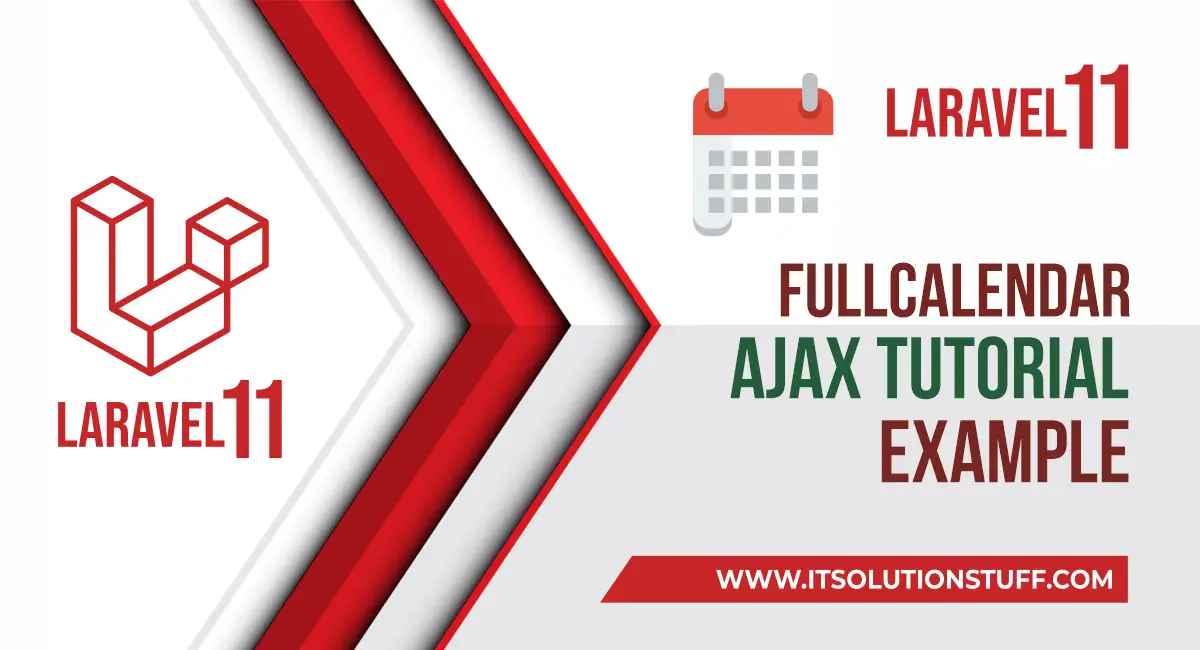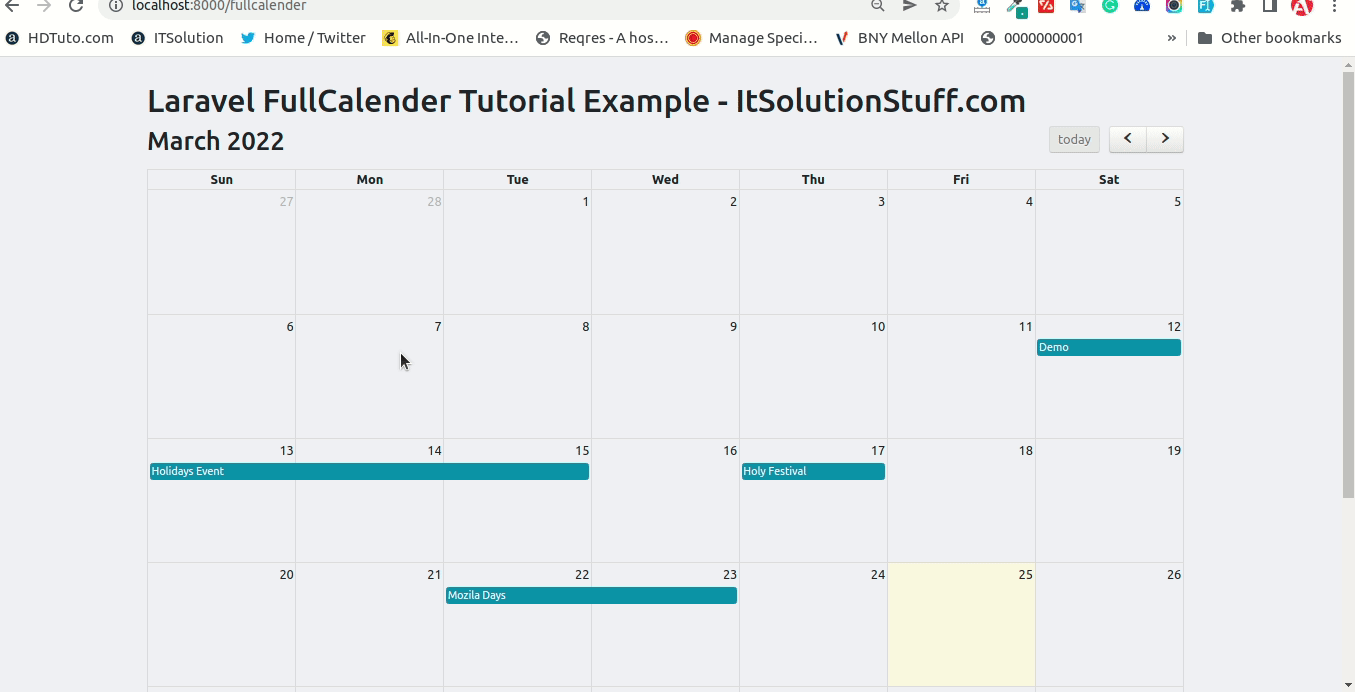How to Create Event Calendar in Laravel 11?
In this tutorial, we will learn how to create a dynamic event calendar with laravel 11 fullcalendar.
FullCalendar is a tool for organizing events. You can add, edit, and create events easily. It helps you keep track of your schedule in a dynamic way. If you need to change something about an event, you can do it easily. It's like having a big calendar where you can see and manage all your events.
In this example, we will simply create a CRUD application with FullCalendar so you can easily create events, edit events by drag and drop, and delete events. In this example, we will create an events table with a start date, edit date, and title column. Then you can add, edit, and delete that event with the database.
Let's follow a few steps to make a Laravel FullCalendar CRUD app:

Step for Laravel 11 Integrate FullCalendar Example
- Step 1: Install Laravel 11
- Step 2: Create Migration and Model
- Step 3: Create Controller
- Step 4: Create Routes
- Step 5: Create Blade File
- Run Laravel App
Step 1: Install Laravel 11
This step is not required; however, if you have not created the Laravel app, then you may go ahead and execute the below command:
composer create-project laravel/laravel example-appStep 2: Create Migration and Model
In this step, we have to create a migration for the events table using the Laravel 11 `php artisan` command, so first, fire the below command:
php artisan make:migration create_events_tableAfter this command, you will find one file in the following path "database/migrations," and you have to put the below code in your migration file to create the events table.
<?php
use Illuminate\Database\Migrations\Migration;
use Illuminate\Database\Schema\Blueprint;
use Illuminate\Support\Facades\Schema;
return new class extends Migration
{
/**
* Run the migrations.
*
* @return void
*/
public function up(): void
{
Schema::create('events', function (Blueprint $table) {
$table->id();
$table->string('title');
$table->date('start');
$table->date('end');
$table->timestamps();
});
}
/**
* Reverse the migrations.
*
* @return void
*/
public function down(): void
{
Schema::dropIfExists('events');
}
};
Then afterward, simply run migration:
php artisan migrateAfter creating the "events" table, you should create an Event model for items. First, create a file at this path: "app/Models/Event.php" and put the content below in the Event.php file:
app/Models/Event.php
<?php
namespace App\Models;
use Illuminate\Database\Eloquent\Factories\HasFactory;
use Illuminate\Database\Eloquent\Model;
class Event extends Model
{
use HasFactory;
/**
* The attributes that are mass assignable.
*
* @var array
*/
protected $fillable = [
'title', 'start', 'end'
];
}
Step 3: Create Controller
Now, you need to create a new FullCalendarController for index and ajax methods. So, first run the command below:
php artisan make:controller FullCalenderControllerAfter this command, you can find FullCalendarController.php file in your app/Http/Controllers directory. Open FullCalendarController.php file and put below code in that file.
app/Http/Controllers/FullCalenderController.php
<?php
namespace App\Http\Controllers;
use Illuminate\Http\Request;
use App\Models\Event;
use Illuminate\Http\JsonResponse;
class FullCalenderController extends Controller
{
/**
* Write code on Method
*
* @return response()
*/
public function index(Request $request)
{
if($request->ajax()) {
$data = Event::whereDate('start', '>=', $request->start)
->whereDate('end', '<=', $request->end)
->get(['id', 'title', 'start', 'end']);
return response()->json($data);
}
return view('fullcalender');
}
/**
* Write code on Method
*
* @return response()
*/
public function ajax(Request $request): JsonResponse
{
switch ($request->type) {
case 'add':
$event = Event::create([
'title' => $request->title,
'start' => $request->start,
'end' => $request->end,
]);
return response()->json($event);
break;
case 'update':
$event = Event::find($request->id)->update([
'title' => $request->title,
'start' => $request->start,
'end' => $request->end,
]);
return response()->json($event);
break;
case 'delete':
$event = Event::find($request->id)->delete();
return response()->json($event);
break;
default:
# code...
break;
}
}
}
Step 4: Create Routes
In this step, we will add routes for controller method. So first, add the route below in your routes.php file.
routes/web.php
<?php
use Illuminate\Support\Facades\Route;
use App\Http\Controllers\FullCalenderController;
Route::controller(FullCalenderController::class)->group(function(){
Route::get('fullcalender', 'index');
Route::post('fullcalenderAjax', 'ajax');
});
Step 5: Create Blade File
Okay, in this last step, we will create fullcalendar.blade.php file to display full calendar and we will write JavaScript code for CRUD app. So first, create fullcalendar.blade.php file and put the below code:
resources/views/fullcalender.blade.php
<!DOCTYPE html>
<html>
<head>
<title>Laravel 11 Fullcalender Tutorial Tutorial - ItSolutionStuff.com</title>
<meta name="csrf-token" content="{{ csrf_token() }}">
<link href="https://cdn.jsdelivr.net/npm/bootstrap@5.0.2/dist/css/bootstrap.min.css" rel="stylesheet">
<script src="https://cdnjs.cloudflare.com/ajax/libs/jquery/3.1.1/jquery.min.js"></script>
<link rel="stylesheet" href="https://cdnjs.cloudflare.com/ajax/libs/fullcalendar/3.9.0/fullcalendar.css" />
<script src="https://cdnjs.cloudflare.com/ajax/libs/moment.js/2.24.0/moment.min.js"></script>
<script src="https://cdnjs.cloudflare.com/ajax/libs/fullcalendar/3.9.0/fullcalendar.js"></script>
<script src="https://cdnjs.cloudflare.com/ajax/libs/toastr.js/latest/toastr.min.js"></script>
<link rel="stylesheet" href="https://cdnjs.cloudflare.com/ajax/libs/toastr.js/latest/toastr.min.css" />
</head>
<body>
<div class="container">
<div class="card mt-5">
<h3 class="card-header p-3">Laravel 11 FullCalender Tutorial Example - ItSolutionStuff.com</h3>
<div class="card-body">
<div id='calendar'></div>
</div>
</div>
</div>
<script type="text/javascript">
$(document).ready(function () {
/*------------------------------------------
--------------------------------------------
Get Site URL
--------------------------------------------
--------------------------------------------*/
var SITEURL = "{{ url('/') }}";
/*------------------------------------------
--------------------------------------------
CSRF Token Setup
--------------------------------------------
--------------------------------------------*/
$.ajaxSetup({
headers: {
'X-CSRF-TOKEN': $('meta[name="csrf-token"]').attr('content')
}
});
/*------------------------------------------
--------------------------------------------
FullCalender JS Code
--------------------------------------------
--------------------------------------------*/
var calendar = $('#calendar').fullCalendar({
editable: true,
events: SITEURL + "/fullcalender",
displayEventTime: false,
editable: true,
eventRender: function (event, element, view) {
if (event.allDay === 'true') {
event.allDay = true;
} else {
event.allDay = false;
}
},
selectable: true,
selectHelper: true,
select: function (start, end, allDay) {
var title = prompt('Event Title:');
if (title) {
var start = $.fullCalendar.formatDate(start, "Y-MM-DD");
var end = $.fullCalendar.formatDate(end, "Y-MM-DD");
$.ajax({
url: SITEURL + "/fullcalenderAjax",
data: {
title: title,
start: start,
end: end,
type: 'add'
},
type: "POST",
success: function (data) {
displayMessage("Event Created Successfully");
calendar.fullCalendar('renderEvent',
{
id: data.id,
title: title,
start: start,
end: end,
allDay: allDay
},true);
calendar.fullCalendar('unselect');
}
});
}
},
eventDrop: function (event, delta) {
var start = $.fullCalendar.formatDate(event.start, "Y-MM-DD");
var end = $.fullCalendar.formatDate(event.end, "Y-MM-DD");
$.ajax({
url: SITEURL + '/fullcalenderAjax',
data: {
title: event.title,
start: start,
end: end,
id: event.id,
type: 'update'
},
type: "POST",
success: function (response) {
displayMessage("Event Updated Successfully");
}
});
},
eventClick: function (event) {
var deleteMsg = confirm("Do you really want to delete?");
if (deleteMsg) {
$.ajax({
type: "POST",
url: SITEURL + '/fullcalenderAjax',
data: {
id: event.id,
type: 'delete'
},
success: function (response) {
calendar.fullCalendar('removeEvents', event.id);
displayMessage("Event Deleted Successfully");
}
});
}
}
});
});
/*------------------------------------------
--------------------------------------------
Toastr Success Code
--------------------------------------------
--------------------------------------------*/
function displayMessage(message) {
toastr.success(message, 'Event');
}
</script>
</body>
</html>
Run Laravel App:
All the required steps have been done, now you have to type the given below command and hit enter to run the Laravel app:
php artisan serveNow, Go to your web browser, type the given URL and view the app output:
http://localhost:8000/fullcalenderOutput:

I hope it can help you...

